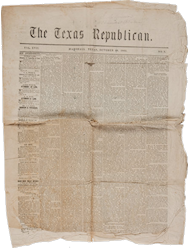[Marshall] Texas Republican, September 8, 1860
Whatever exaggerations there may have been in the recent incendiary movements (and we admit there have been many exaggerations) in Texas, one thing is evident, they have been too numerous to have resulted from accident. Over a million of dollars worth of property has been destroyed in the course of a few weeks. And if we are to place any reliance in the testimony elicited by an examination of the negroes, all these outrages were the work of abolition emissaries.
That the followers of Lincoln in the Northern States should endeavor to shield themselves from the necessary result of their doctrines, by charging that the abolition raid in Texas was a mere electioneering trick, is not surprising. But that a public man or a newspaper published in the State, where the facts are known should endeavor to aid the abolitionists in such an escape surpasses our comprehension. Yet there is such a newspaper, and such men, as will be seen from the subjoined extract from an article in the Houston Telegraph:
The Austin Intelligencer and some other papers of that class, are quite busy in attempting to establish the idea that the reports of the burning of towns and other outrages in Northern and Eastern Texas, were started “just previous to the election” in order to influence the election. The attempt is a significant one, and one worthy the attention of the public. Judge Paschal, the former editor of the Intelligencer, and who is responsible for its leading ideas, in a speech at Austin, a short time since, attempted to disprove the burnings, and to show there was no cause whatever for alarm. The Intelligencer even yet omits no opportunity to throw discredit on the reports. Other papers are doing the same thing. We now ask: ARE THESE MEN SOUND ON THE SLAVERY QUESTION?
We do not ask whether they own slaves, or whether they are identified enough with us to constitute a security for their good conduct. What we ask, is, whether they have not for three years past, and are not yet pursing a course calculated to weaken the institution in the South, calculated, in fact, to invite just such an inroad into the State as we have had for the past two months, and calculated to keep the wicked men engaged in that inroad, upon their work? It will be recollected that we have ever since 1858 when they were first promulgated in Texas, denounced Paschal’s free labor notions as the very essence of abolition. We have stated, again and again, that they were doctrines against which we had contended from our very youth, both in the North and in the South, that in the North they had always been called abolitionism, and were the very foundation of that party, that we were astonished that they should have found an advocate in the South, and that the fact of their advocacy alone was enough to satisfy us of the badness of heart, or the want of wisdom of their advocate—badness of heart in the leader, want of wisdom in the dupes.
The Galveston News contains an indignant article upon the same subject, and other papers are following suit. Such men, and such newspapers are as denounced, are, in our opinion, far more dangerous than the Palmers, the Lemmons, and others who have been run out of the country.
